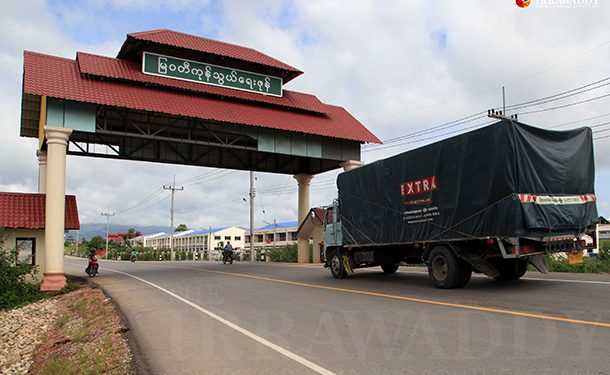Border trade with Thailand through Karen State’s Myawaddy crossing has plummeted by more than a third, or US$ 363.034 million, over the past five months from the same period last year, according to the Myanmar junta’s Commerce Ministry.
Myawaddy border trade from April 1 to September 29 this year was worth $782.644 million, down from $1,145.678 million last year. Traders blame the junta’s frequent policy changes, red tape for import license applications, and tighter checks along the Asian Highway.
Myanmar exports corn, rubber, peppers, onions and fishery products to Thailand through Myawaddy. However, the Thai government’s tax exemption on Myanmar corn exports has expired, so merchants are only exporting cabbages, cauliflowers, peppers and onions for now.
Myanmar uses Myawaddy to import materials for its cut-make-pack (CMP) industry, consumer goods, foodstuffs, construction materials, machinery, vehicle spare parts, pharmaceuticals and electronics. Imports have also declined, with traders citing red tape in the import license application process.
“Trade is declining due to [junta] policies,” one local business owner remarked. “They are changing trade policies frequently in response to the political situation. In border trade, if something bad happens on our side, [Thai] buyers respond by offering lower prices or changing their orders. So, we are forced to sell at their prices.”
Junta policy changes and restrictions have hit high-season corn exports especially badly, he said. Corn exporters have even been arrested, he added.
“[The regime] is not facilitating trade or transportation … it is not providing any support that enables us to gain an advantage with buyers,” said the business owner, who spoke on condition of anonymity.
“We also have to make a lot of payments along the route. Policies are not stable. In some cases, orders that are issued one day take effect the next day. Goods are being seized by authorities during transportation. Normally, we export corn and rice powder at this time. But, no merchant can export because of low profitability.”
Adding to high fuel and other transport costs, cargo trucks face payments on various “tariffs” charged by different groups along the route. Meanwhile, Thai buyers are currently offering lower prices for corn powder, he said.
A business owner from Myawaddy said: “It is difficult to get an import license. We have to seek approval from various levels to import certain goods. In some cases, they don’t grant licenses at all. So, imports have declined by around 80 percent.”
The regime imposes tight checks on Myawaddy No. 2 Friendship Bridge, which is mainly used by cargo trucks involved in border trade.

















